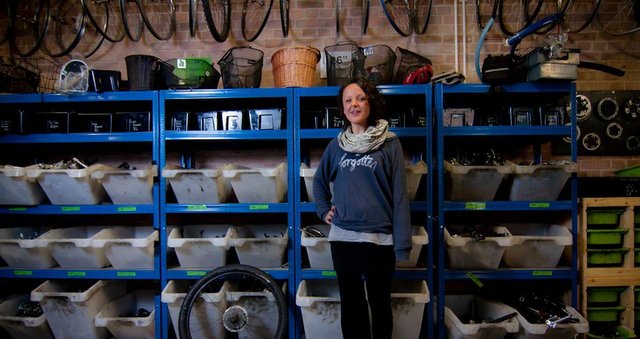Caroline Stewart is bucking the trend, she’s one of a growing number of female bike mechanics taking the industry by storm.
Graduating from Cycle Systems Academy with a Level Three QCF Diploma in Cycle Maintenance, Caroline now works in W.F. Holdsworth Cycles.

Since January this year, I’ve worked in three different bike shops as a mechanic. In that time, I’ve not really had too many of the ‘no, no – can I speak to someone who knows what they’re talking about’ moments. In most cases I’ve been able to, from a technical point of view, hold my own in any conversation. I’ve had one phone conversation with a customer who didn’t want me to try and work on their bike, but I think that was more to do with the fact that they trusted and had worked with the male mechanic, rather than who I was or my gender or anything.
But then again, what I have had is the flip side, having female customers that are far happier to speak with a female mechanic who understands some of the issues with ride comfort, frame sizing and stuff like that, which is slightly ironic because I’ve never ridden a women’s specific frame.
My early career background is engineering, I’m ex-military, ex-Royal Navy, I left the service in ’94. When I came out of the forces, I stayed in engineering to a degree, and then ended up in IT. Originally doing IT support, fixing stuff and then gradually moving further and further in to support management, then systems management, and then business management. So, as of last year, I was the business systems manager for a group of agricultural companies and that’s about as corporate as you can get.
I was getting further and further away from doing stuff and more and more in meetings, the situation at the company was fairly stressful. You’ve got lots of corporate nonsense, you’ve got the stress, I was travelling quite a lot with business and at the same time, over the course of the last five years, I’d been returning to cycling. The reason I took so long off is also the reason that I’m no longer in the Forces, because I was disabled out because of an Achilles tendon injury, so I never really got back on the bike.

Then about five years ago, I started mountain biking, well, mucking around in the forest near here, on a really cheap mountain bike. I then caved about two and a half years ago and started road riding. I’ve still got my 1989 vintage Peugeot Optimum race bike, the one I used to train and race on.
Getting back on the road, my other half is a schoolteacher, he went to Cambridge, so he used to cycle in and out, but he was more of a recreational cyclist. He decided to buy a bike, so he could come out riding with me, do some road training together. At some point, about a month after that, he suggested that we do Lands End to John O’Groats, so we did. So that, plus getting involved in social media on the cycling side, cycling has become more and more of an important part of who I am, who we are as a couple, what we do, what takes up our time. The combination of wanting to get away from the corporate side and wanting to get further and further back into the cycle trade and cycling as a whole, kind of flicked a switch.
Now, I’d been thinking about this for a while, and then about a year and a half ago, I heard Sean Lally talking about the bike mechanics training company he owned, Cycle Systems Academy with John from VeloCast. One of the things he mentioned, was that one of his female graduate had gone pretty much straight into a one-year apprenticeship with a women’s pro-team, Matrix Fitness Racing Academy. That had been floating around in my mind the whole time, so when it came to looking at training, as I had Sean up there in my mind, I contacted him around September/October last year and started talking about what the possibilities of moving into the trade from my background were.

I did look at other training companies for mechanics courses, but from my discussions with Sean, the reason I chose Cycle Systems Academy is because a qualification isn’t actually valid, unless it’s a, possible to fail and b, externally verified and most cycle training schemes are either neither or one of the two, but Cycles Systems was. I went to somebody who had systems in place that I understand and respect, that’s the reason. If you can’t fail the qualification to be honest the qualification is not worth taking.

Both Level Two and Level Three mechanics courses are run over ten full days, Cycle Systems do offer Levels Two and Three as an extended five weekend course, so you can do it over a period of a few months, but it’s basically two weeks, with full days in the Academy itself. It’s broken down into around 7-8 modules, covering everything from customer service, the soft-skills, the legalities and the regulatory side of the trade right through to, on Level Two, frame preparation. You end up sitting there with a bare cycle frame and a big pile of bits, like a naughty 5-year-old and you’re expected to put it together and have nothing left over.
Interestingly on Level Two, which is kind of your introduction to the trade and basic mechanics of a bike, we had a couple of mechanics, but we had a lot of hobbyists, and I was the only girl on the course. But on my Level Three course there were 3 of us girls out of a group of 8. It was the first time Sean had seen so many women on the same course. He then had, a couple of weeks later, a Level Two course where he had three girls on it as well, I mean that in itself is a really good sign.
Bike shops are like a lot of specialist shops, they tend to have a crowd of regular people in there, who are in to the things, so you go to a games shop or something similar, you get a group of people that tend to hang out there. Historically, it has been a very male centric activity, touring cycling – less so, but any sort of competitive cycling.
There is a slight difference in geometry on women’s specific frames, but there are probably smaller blokes who would be better suited because of the nature of their geometry. In some cases there are a couple of issues for women, usually it’s around reach, so it’s the length of the bike rather than anything else. So, it’s a tough one, to have that opportunity to get smaller frame sizing, to make it accessible for a lot of women riders, I think it’s a great thing. Whether it’s exploited as a marketing ploy and prices pushed up because of it, it’s a hard one to call, but as a said, all of my bikes are in effect men’s frames.

In my stable, I’ve got four main bikes, I have my Cannondale Synapse, which is my road bike and carried me the length of the country on the Lands End to John O’Groats. I’ve got a Cube Cross Race Cyclocross bike, which is ridiculous amounts of fun and the reason why I never use a mountain bike when I go out in the woods with my daughter. I’ve got an Airnimal Chameleon, which is a performance folding bike, it’s brilliant, but doesn’t fold quite as small as a Brompton, although I’ve never had problems commuting on the train with it. The other bike I own is a 1989 Peugeot race bike, which was top of the range at the time other than the carbon when I bought it, it’s also the bike I used to race. Apart from the saddle, everything is original, being injured, it’s been sat in a shed, so it’s been dry stored for 18 years, it’s immaculate.
I think electronic groupsets are going way away from the tradition of being able to just pick up a spanner and go for it, but when they’re working well, they’re amazing, the power and speed of the shift, you don’t have to time things. The rear mech and the front mech, know where each other are, therefore the front mech auto-trims. Obviously you try not to fully cross chain, but you can use a wide gear range, without having to trim and chase, to make sure the cage isn’t touching because the little computer brain knows where everything is and adjusts accordingly.
I’d love to get involved in the sport, whether that’s viable or not I don’t know. Obviously, it would be nice to work for female riders, working for a women’s team would be great. At the moment, as far as I’m concerned, my main thing is establishing myself in the trade and gaining experience. I suppose it’s like a driving test, you learn to pass the driving test and then learn to drive, with any cycle mechanics course if you’re coming in to the trade, you know what you know before hand, you learn how to do it in an ideal environment and then you go work in a shop, and it’s rather different.
I have a lot of experience to gain as a mechanic and Holdsworth where I work is great place for that, because of the nature of where we are and what comes in, we have very high-end road bikes and also the other end of the market. So we’ll see commuting bikes that are made up of 1960s frames and components, really old knackered stuff put together, that somebody’s managed to keep riding. Through to the generic mid-range and top end road bikes. The variety is both a boon and a challenge, because variety means continually having to find new ways of doing stuff, seeing new problems.




